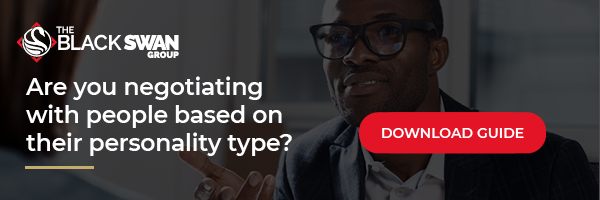You might be the best negotiator in the world. But if you don’t know how to deal with people and treat them with respect, you won’t get the results you’re aiming for.
That’s because, at the end of the day, nobody does a deal with you because they need to. They do deals with you because they want to. And, more often than not, the reason they want to do business with you is because they like you.
Becoming a better negotiator starts with strengthening your interpersonal communication skills. The sharper your skills are, the easier it will be to start using Tactical Empathy™.
Getting Started with Tactical Empathy
Tactical Empathy is the key to successful negotiations. Unfortunately, it rarely comes without hurdles.
We have to allow ourselves to be present and in the moment, and that takes some effort. Adopting Tactical Empathy requires a lifestyle change in how we communicate. For some, the move comes quickly. For others, it’s hard to break old habits, and they continue to interrupt the dialogue with their inner monologue.
Many people will start conversations with you, and after a few seconds, you may begin to think, Where is this going? I'm not interested. Hurry up and finish talking, I have something to say! Without much analysis, you determine that there won’t be any significant losses or consequences whether you listen or not. So, you’d rather not listen because it requires no effort.
But as the Indian philosopher Jiddu Krishnamurti once said, "When you are listening to somebody, completely, attentively, then you are listening not only to the words, but also to the feeling of what is being conveyed, to the whole of it, not part of it."
Per Krishnamurti, the bottom line is that feelings will not show themselves if we are focused on what we have to say next and our own emotions instead of what the other side is saying. These critical discoveries will remain forever hidden because we’re not open to revealing them through active listening.
Getting in The Right Mindset
One of the most common issues we see with Tactical Empathy and interpersonal communications is that many people "save" the Tactical Empathy techniques for what we consider "essential" negotiations—most likely, those with financial gain as a goal. Secondary are interpersonal encounters in which we revert to old habits like one-way communication and disregarding feelings.
The issue is that treating The Black Swan Group's techniques like luxury and collectible items that we only use on special occasions won’t help you improve. As Germany Kent said, “People will reveal who they are if you just pay attention.”
When we perceive that the other side doesn't have much to reveal to us because we think we have all of the information we need, we become disinterested. The need to use negotiation techniques as tools becomes forgotten.
Unfortunately, many people don’t believe that interpersonal relationships and business relationships have the same value. Changing your mindset to treat your interpersonal communications the same way you’d treat your business relationships is a good start.
Negotiation and Interpersonal Communication: The 3 Cs
There are many commonalities in both business and interpersonal relationships. For starters, they both require the three Cs:
- Credibility
- Communication
- Commitment
Listening is crucial to all three. We become credible by building rapport. We display excellent communication skills by making the other side feel heard, and we show commitment by cultivating long-lasting relationships.
We can accomplish all three with Tactical Empathy.
What’s the key to getting better at negotiation and developing stronger interpersonal communications skills? Cultivate your investment in our techniques by using Tactical Empathy in your everyday social interactions.
Start by trying the ”quick two-plus-one”: Use a Label™, follow it up with a Mirror™, and then use Dynamic Silence™ and listen.
By using negotiation in your everyday social interactions, you'll make those experiences training grounds—the perfect trial-and-error tests that will prepare you to land the next big deal.


